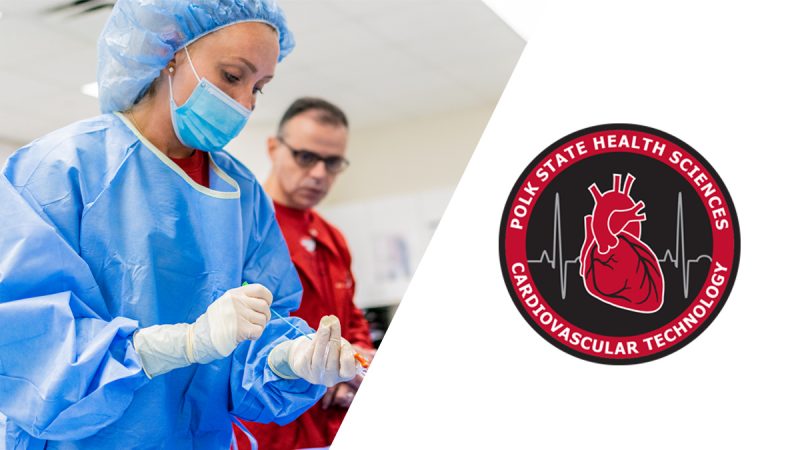Polk State Cardiovascular Technology connects students with professionals & real-world experiences

Polk State College’s Cardiovascular Technology (CVT) Program is connecting its students to professionals from the field with its monthly CVT conferences, where students have the opportunity to hear from experts, ask questions about the field, and learn more in-depth about content they have touched on in the program and are learning more about in their clinicals.
Clinical Education Coordinator Jennifer Dunifon, a proud Polk State CVT alum who returned to the College in her new role in fall 2021, has implemented the monthly CVT conferences as an additional way to engage students in their clinical experiences and real-world application of what they have learned throughout their courses.
“I wanted a way to bring the students together during their clinical year, when they don’t have class on campus, to share their experiences and meet and learn from industry professionals,” Dunifon explained. “It will help them make the transition from students to professionals.”
Lauren Register, a 2013 graduate of the Polk State Cardiovascular Technology Program who serves in cardiac rhythm management for Boston Scientific, visited the class in March to provide an overview of electrophysiological studies.
Boston Scientific is a global medical technology leader and is known for making its own batteries for its pacemakers. Register shared a variety of these pacemakers with the class as well as implantable cardioverter defibrillators, electrical concepts, how these devices work, and how to troubleshoot them in the field.
With experience in cardiovascular labs at both Lakeland Regional Health and Winter Haven Hospital, Register provided scenarios in which the students could find themselves responding within their clinicals or in their future careers.
“The Cardiovascular Technology Program is growing in a super positive way. I would definitely suggest the program because it covers all aspects of cardiology… and teaches them real-life things they need to know before they get out into the field and experience it themselves.”
Lauren Register
Boston Scientific
Polk State CVT Graduate
“It’s much different than textbook learning to get some real-life advice and what someone else has learned from trial and error,” Register said. “The Cardiovascular Technology Program is growing in a super positive way. I would definitely suggest the program because it covers all aspects of cardiology… and teaches them real-life things they need to know before they get out into the field and experience it themselves.”
Polk State CVT boasts a 100 percent credentialing exam pass rate as well as a 100 percent job placement rate, illustrating its rigor, reputation, and success in preparing graduates to become highly skilled cardiovascular technologists.
Student Derek Kelley, who has Wolff-Parkinson-White (WPW) syndrome, explained how his own condition inspired his pursuit of education and a career in cardiovascular technology. WPW is a condition in which there is an extra electrical pathway in the heart that can lead to periods of rapid heart rate.
“I’ve had a (catheterization) before, so I’ve seen the cath labs and it’s really cool what they do. It sparked my interest because I’ve always had to be extra attentive to my heart,” he explained. “I chose Polk State because you don’t have to go to these big universities to get the degree that costs so much more when you can go to your community and get a quality education.”
Polk State’s tuition is approximately one-third the cost of that at state universities. Students in the CVT Program graduate with the Polk State Associate in Science in Cardiovascular Technology degree.
Kelley and his peers shared that the hands-on, real-world experiences they receive through Polk State CVT are the highlights of the program for them.
“What’s great about these CVT conferences is that a lot of times we have questions while we are in our clinicals,” Kelley explained. “This is a great way to get those questions answered by being able to ask the professionals from the field.”
“I would say enroll at Polk State,” he added, “and definitely go cardiovascular because you get to save lives every day.”
The application for Polk State College’s Cardiovascular Technology Program will be open April 8 through June 30 for the 2022-2023 Academic Year. More information about the Polk State Cardiovascular Technology Program is available at www.polk.edu/CVT.

